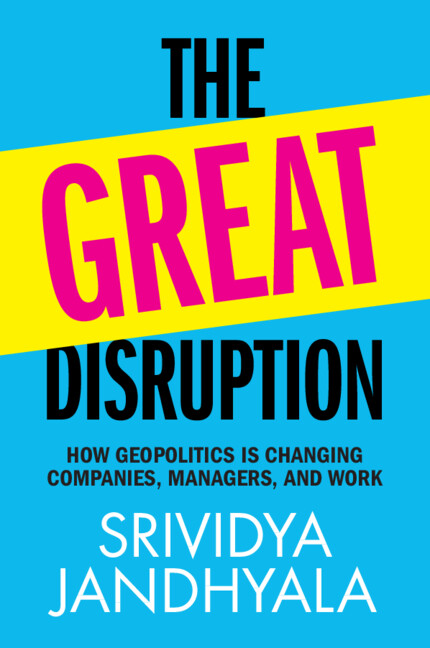With Srividya Jandhyala
Julia Smith, editor-in-chief of ESSEC Knowledge: Hello, everyone, and welcome to Be in the Know, the ESSEC Knowledge podcast sharing the research and expertise of ESSEC professors. Today, I'm here with Srividya Jandhyala, Professor of Management. Srividya is here to talk about her new book on geopolitics and business. To get things started, can you tell us a bit about what led to this book? What role do you think that business schools can play?
Srividya Jandhyala, Associate Professor of Management at ESSEC Business School: Thank you, it's a pleasure to be here, and I'm excited to share a little bit about my thinking on this, and the book that just came out. I've been thinking about these topics for a long time, but when I look around the world today, most managers of global companies came of age at a time when geopolitics did not play such a constraining role in business. When they went to business school, there were probably more opportunities than there were challenges. They went to business school to learn about things like reading financial statements, or analyzing investments, maybe selling to old and new customers, and marketing. However, they had little to no training on navigating a world that was really dominated by grand politics. They now face a new landscape, and they have to figure it out on the fly. They have to, in real time, try to figure out what their best options are, what strategies they can adopt, and what is really effective. Business schools can support them with tailored courses, and by bringing sophisticated and nuanced research on effective strategies to manage the changing geopolitical environment. My book was an attempt to try to bridge this gap and try to bring practice and research together to emphasize these topics.
Julia Smith: It's certainly very timely, and the intersection of geopolitics and business is, of course, a key part of ESSEC’s strategy with our Institute for Geopolitics and Business focusing on these questions. So, what would you like readers to take away from your book?
Srividya Jandhyala: I want to emphasize three themes. There's been a lot of discussion about geopolitics in the media, in policy, in academia. A lot of this talk has focused on specific events, maybe a conflict, maybe specific tariffs. But I would say that we need to take a broader view to really understand the impact of geopolitics on business.
1. Geopolitics and structural changes
One is that geopolitics shapes global businesses through what I call structural changes. For a company to explore far-off countries, expand in new markets, global companies really need a healthy institutional scaffolding. What does this mean? This includes systems to facilitate market entry, maybe create a level playing field for companies from different countries, a mechanism to safeguard their assets and employees in foreign markets and a way for them to lower their adaptation costs through institutional alignment. However, as global companies operating across borders are now discovering, these structures are changing. In the past, we were building these structures up, and now these structures are seeing a bit more wobble in them, if I may.
A useful analogy is a party game like Jenga. You stack blocks to make a tall, freestanding tower. That's the easy part in some way. The foundation remains strong when the game begins. As we remove blocks from the tower, at first, the tower still stands, but as we remove more, it will wobble more. And at some point, it will collapse. So the challenge for global businesses is to figure out an alternate system to support their international operations as the system changes. They have to adapt, they have to figure out how else they can get this institutional support as they go off and explore new markets. So that's one theme of the book, that geopolitics really affects global businesses through structural change.
2. Corporate nationality is the key feature of geopolitical risk
A second theme and core idea in the book is this notion that the defining feature of corporate geopolitical risk is corporate nationality. Okay, so step back. Let me ask you a question. Where are you really from? Now, that can be a really polarizing question for lots of people, but it can be a polarizing question for companies as well. When national security considerations are high, that's the question that defines a company's geopolitical risk in a foreign market. It is the answer to this question that defines whether a company faces challenges, or it finds opportunities. It shapes how companies compete, the resources they have access to, and whether they have an advantage or disadvantage in global operations. So this idea of corporate nationality, or where the firm is from, drives the reactions of different types of stakeholders, governments, regulators, customers, and so on. The main issue that a foreign company faces is that it cannot credibly commit to local stakeholders who are worried about national security, and that the company will not act, either directly or indirectly, to support their home countries or home governments' actions. So what does this mean? This means companies that come from a country that is perceived to be a rival will face challenges and even hostilities. Those challenges may have nothing to do with what the company is doing, or how good at products and services are, or how well they manage their operations. Rather, it all comes down to one thing, which is their corporate nationality. So a second theme that I explore in the book is this idea that corporate nationality is the defining feature of corporate geopolitical risk.
3. Geopolitics and the future of work
A third idea that I explore in the book is how the future of work is driven by geopolitics. Rising geopolitical tensions means that the idea of a digital nomad will remain a mirage for most people. National security concerns, rising protectionism, and strategic rivalries means that who is doing the work, where work can be done, and how work is accomplished is going to be shaped by geopolitics.
Those are the three broad topics that I want to highlight. First, the fact that geopolitics shapes global businesses through structural changes. Second, corporate nationality is the defining feature of corporate geopolitical risk. Third, the future of geopolitics is driven by geopolitics.
Julia Smith: To build on what you've explained, what advice do you have for companies today? How can they best navigate today's complicated landscape?
Srividya Jandhyala: That's a great question. I think that's probably the question on most people's minds and the million-dollar question for companies.
One thing to point out is that when facing geopolitical flux, successful firms really rely on government actions to support their market activity. This means that managing government relations is going to be crucial for global companies. If I could go so far as to say, in some instances, managing their stakeholders, including government stakeholders, is perhaps more important than market competition.
At the same time, corporate managers really need to continue to think about how to make strategic decisions regarding the classical tools that they have, which is about resource allocation (roughly translating into who gets what). thinking about building competitive advantage, and how my company might win. What do we have that makes us stand out, and how do we win, in terms of adapting the organizational structure, or who does what?
It's this combination of trying to figure out how to manage these external stakeholders, particularly government stakeholders combined with the internal prioritization of thinking about resource allocation and building competitive advantage and adapting the organizational structure. This gets complicated because we're really talking about this combination of internal and external factors. So the kind of tools that they need to build are going to be about broadly scanning the environment to figure out what is going on, and how do we keep up, and how do we understand the different motivations of different stakeholders? Who are the different stakeholders? It’s about learning to scan the environment in more focused ways. Then, that information has to be personalized to the company. Not every geopolitical event will have the same impact on all companies.
Geopolitical analysis and forecasting can provide a starting point, but the next step is really going to be to determine which of those aspects are really relevant for my business, or my company, and how does this affect me?
This step requires familiarity with the company's operations, strong internal ties, domain expertise, none of which are skills that can actually be provided by external sources that are perhaps good at scanning the environment, but not necessarily tailoring to your company's specific situation. Then, there's planning, how the information is relevant for the firm, and how the broader trends are going to affect a particular business. Next, the harder part combines this existing data and trends with imagination and domain knowledge to explore what the possible future states of the world are going to be, and how the company's operations can be adapted to exploit the future state.
Julia Smith: Moving to a more micro level, what can your typical employee do? How do you think geopolitical risk could impact the future of work for us?
Srividya Jandhyala: I think that's a question that all of us are probably thinking about in some way, even implicitly, if not explicitly. There's been a lot of discussion about the future of work, and a lot of this has had to do with thinking about technology, thinking about the location, whether we work from home, to what extent does job allow flexibility, to what extent technology allows us to bridge these different challenges, but I argue that this idea of the future of work is shaped by geopolitics.
Take the life of a digital nomad. This seems like the combination of location and advances in the availability of technology around the world, right? So, the idea of a digital nomad who can actually be located almost anywhere, as long as they have a Wi-Fi connection and their faithful laptop, they can be traveling around the world looking at a beautiful sunrise with a drink in their hand. Sounds great!
But, as I point out in the book, it seems like the workforce of the future may actually look very different from the traditional one, just perhaps not in the ways that you might think. Rising geopolitical tensions mean that the digital nomad will remain a mirage for most people. An alternative future that is taking shape is going to influence who works, where work is being done, and how work is done. What does that mean? National security concerns and rising protectionism are influencing who works. There are more and more restrictions on movement of people and the type of work that they can do.
The second is about where work can be done. There are increasing rules on issues like data protection, and whether you can access a company's database from a foreign location, where data has to be stored, and who can access the data that is being collected. The cross-border transfer of data is one of the most challenging questions that we are facing today. So, these are all driven by geopolitical considerations, rather than technology considerations.
And then, the third aspect is how work is done. Today, the manager's job description has changed. They're no longer thinking only about, “How can my company generate the next generation of semiconductor chips? Or, how do I have the most sophisticated technology in my industry?”
The manager’s job description includes having to deal with things like lobbying, or government relations, or understanding the national security concerns of their governments. This means that a manager who has been in this position because they're good at dealing with the operational, technological or human aspects of the company now suddenly has a new role that is thrust upon them, which is dealing with government stakeholders who are prioritizing national security interests. Their job description has changed quite a bit. So, when you think about the future of work, geopolitics is changing who works, how work is done, and where it can be done.
Julia Smith: It definitely sounds like the future of work is going to mean that we should all be very flexible in how we operate, at the company level or at the individual level. Before we sign off today, is there anything else you would like to mention?
Srividya Jandhyala: I think one thing that I've reflected on quite a bit is this idea that there's a lot of changes that are going on. During periods of geopolitical flux, we tend to focus a lot on the risk, and rightfully so. Companies have invested millions and billions of dollars in foreign assets and foreign workforces are thinking carefully about their global operations. They're rightfully thinking about the challenges that we face. At the same time, during periods of flux, including geopolitical flux, there are a lot of opportunities. Companies should also consciously think about how they can exploit the flux that can create opportunities for them. Companies can leverage their particular position in an industry, or in a sector.
For example, if you are a company that is mining for rare earths. This type of company would have faced big challenges in trying to break through into the global industry because this sector was largely dominated by a few Chinese companies. As demand grows, some Western actors look for alternative sources. Now, there is an opportunity for some smaller firms in this sector to grow and even thrive. So that's an opportunity that exists because of geopolitical flux. In the same way, we talked about companies and their corporate nationality as the defining feature of their geopolitical risk, but corporate nationality could also be a defining feature of geopolitical opportunity.
With more and more countries trying to emphasize their supply chain from start to end, companies in particular third countries can leverage their network position and where they are located. This becomes a strength, an advantage, not just as a risk. So, overall, I just want to highlight the idea that during periods of geopolitical flux, as we are seeing today, there are opportunities for companies to grow and expand and to modify how they operate. That is not just about challenges, but also about growth and opportunity.
Julia Smith: Thank you so much, Srividya. It's great to think about the opportunities that come along with this period of flux, too, and I think that your book is very insightful and gives us a lot of food for thought about that intersection of geopolitics and business.
Srividya Jandhyala: Thank you for having me, it's been a pleasure.
Further reading

The Great Disruption: How Geopolitics is Changing Companies, Managers, and Work (Cambridge University Press, 2025), #1 bestseller on Amazon.









